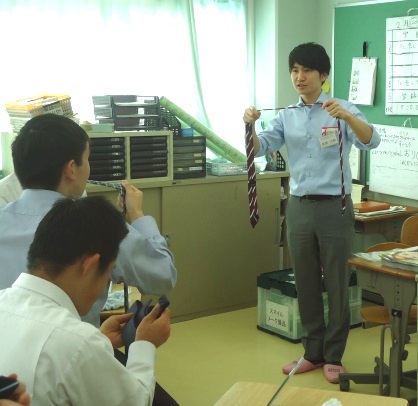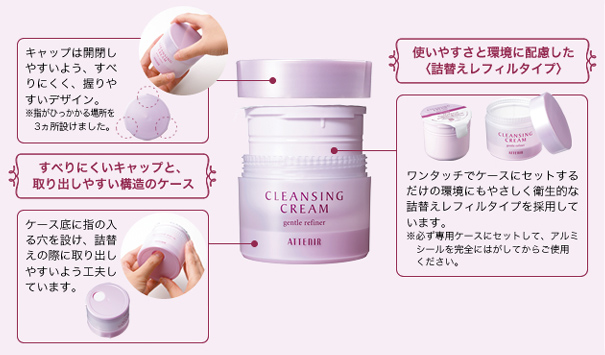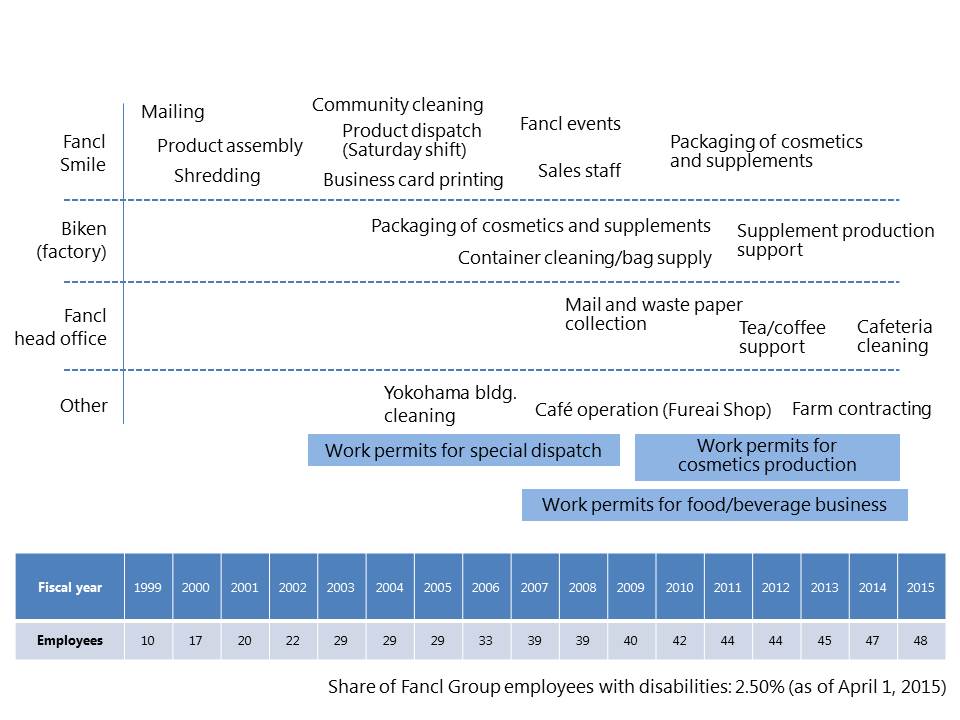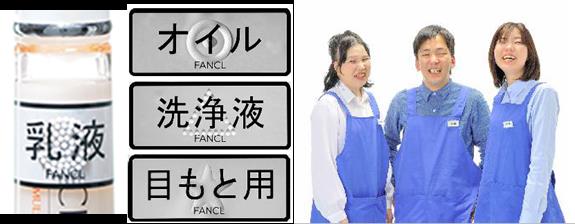- Article
- Industry, Business, Technology
Rebuilding CSR around Human Resources: Fancl Corp.
July 6, 2016
Curious to know what kind of things Fancl Corp. does in in the way of CSR, I had a look at the website of the cosmetics company. There was a page labeled “CSR Topics,” but the content there was not particularly informative. Just looking at this page was not going to tell me what I wanted to know. So I opened Fancl’s monthly CSR activities report. And there I was surprised to find a remarkable range of initiatives being undertaken by this manufacturer of safe, additive-free cosmetics and health products.
Broad Array of CSR Activities
The report for February 2015, for example, begins with a report on the 2015 Low-Carbon Cup held at Tokyo Big Sight. The company was chosen as one of 39 finalists from 1,730 applicant organizations (including companies, schools, NPOs, and other groups), and after a final presentation won the Alterna Best Story Award. The company received the prize for its home-and-office environmental program that purported to be “friendly to employees and tough on executives.”
The next article is another report: this one on the company winning the Social Inclusion Prize at the twelfth Corporate Philanthropy Awards. The award was in recognition of Fancl Smile, a special subsidiary company set up to promote the employment of people with disabilities.
There is also a story about monthly Fancl Seminars, which are led by employees who volunteer their time to teach students at schools and vocational facilities for people with disabilities on grooming, personal hygiene, and health. In February 2015 alone, 19 seminars were held involving 69 employees and 574 participants. The report includes comments from participants and staff at the various schools and institutions where the seminars were conducted.
The CSR activities report concludes with an update on the “We Can Achieve More” Fund—named after the company’s slogan—established with donations from employees. The article reports that assistance from the Fund was conferred to a nongovernmental, nonprofit group called Action against Child Exploitation (on February 20) and the Kanagawa Aerobic Federation (on February 27).
The February issue was not particularly special. Even when no special events are held, the monthly newsletter offers details on Fancl Seminars and other initiatives. Month after month, it contains the same quantity and quality of information on a broad array of activities.
Change of Direction
What can we read into the overwhelming volume of Fancl’s CSR initiatives? A quick glance at the activities involving the company and its employees on a daily basis is not enough to reveal the coherent relationship linking them together. How does the company seek to integrate its business activities with efforts to address social issues?
This is a question with which Fancl once grappled. From the perspective of their connection to society and various stakeholders, the company’s undertakings—quality control, pharmaceuticals, the environment, human resources, and social contributions—all seemed indispensable and important. There was a pervasive feeling within the company that CSR consisted largely of environmental and social contribution activities that existed outside the company’s main business, that it largely helped to ensure that corporate activities were not in violation of rules and regulations, and that it was something employees and the company should do when they had the time or energy to spare.
Fancl was keen on “eliminating the negatives” from society (another key company slogan) in each of these activities, but no attempt had been made to coordinate them by analyzing their core motives, gaining an understanding of underlying social trends, and ascertaining who the key stakeholders were and what they expected of the company. The company remained without a clearly identified CSR goal, contenting itself with a vague sense of “doing good” for society.
It has laudably continued to engage with welfare facilities since its founding and has been actively pursuing environmental activities through efforts to reduce the volume of waste it produced. It also has a strong tradition of proactively investing in human resources. But an important element was missing: an awareness of what Fancl was in a unique position to provide. This realization prompted a major rethink. It was not enough for the company to recognize the value of its own initiatives; they needed to be acknowledged and appreciated by society as a whole for them to have real meaning. The result was a thoroughgoing refocusing of the company’s CSR program.
Remaking CSR Policy
Before discussing Fancl’s relaunch of its CSR policies in greater depth, let us take a brief look at the company’s history. Fancl is a cosmetics company that was founded in April 1980 by Kenji Ikemori, who still serves as chairman and CEO. Ikemori started the company from a desire to offer additive-free cosmetics to customers who suffered skin problems caused by preservatives and other additives in conventional cosmetics. The company later branched out into health supplements. Supplements were expensive at the time, and Fancl’s affordable prices played an important role in helping them enter the mainstream. Today the company also runs a health food business and prides itself on being a company that helps its customers to “create beauty from the inside out.”
The company’s ideal when it was founded was “to have a sense of justice and equity, to eliminate the negatives in the world.” Inspired by a philosophy of “we can achieve more,” the company continues to “strive to eliminate customers’ negative experiences, and pursue gentleness, safety, and assurance” in its products. The company aims to “put ourselves in customers’ shoes” and claims that “the happiness of our customers forms the basis of everything we do.”
After becoming chairman in 2003, Ikemori receded from active management to become honorary chairman in 2005 but returned as CEO in June 2013 to oversee the reorganization of company management.
Fancl was a startup whose name quickly became synonymous with additive-free cosmetics. But the success was not without growing pains. As Ikemori admitted when retaking the reins at the company, “We were able to build up the brand quickly and to achieve growth. But I think my stepping aside as CEO during our growth phase coincided with a lot of changes in the competitive environment as we expanded into new business areas. This may have blurred the company’s raison d’être, and we began to lose sight of what made us competitive in the beginning. We became less clear about where our targets lie, and this ultimately led to a decline in the company’s results.” [1]
The task of rebuilding Fancl’s CSR therefore coincided with the remaking of the company itself. It was guided by the company’s founding aim of eliminating the negatives from people’s lives and the notion that the value of the company would be determined by whether or not this was recognized by society.
The first step was gaining an understanding of society’s views. Using the ISO 26000 guidelines on corporate social responsibility and the UN Global Compact, Fancl went about identifying who its stakeholders were, what they were thinking, and what they expected from the company, carefully examining all activities that could be considered CSR, including those relating to quality control and pharmaceuticals. The company also announced its participation in the Global Compact.
It was not enough, though, for the CSR department alone to understand ISO 26000. The effort would have little meaning unless all employees were aware of society’s expectations and standards. Fancl’s next step was therefore to translate and edit the guidelines into language that was relevant to employees at each step of the value chain, from research and planning to production and distribution, sales, human resources, society and management, and the environment. This was an inspired way of making use of the ISO 26000, which provides guidelines rather than a set of standards.
Outside opinion was incorporated without losing sight of the things that made Fancl unique, as expressed in the founder’s desire to eliminate the negatives—people’s anxieties, unease, inconvenience, and dissatisfaction. The meaning of the company’s existence was to eliminate these negatives with high-quality products and services. After soul-searching on what they could do as a group of specialists in additive-free cosmetics and health foods and how they could pursue such efforts while working closely with society, Fancl’s managers concluded that the company’s main business operations was exactly the channel through which it should implement its CSR.
Once the company resolved to build a CSR program that would make the most of Fancl’s unique strengths and characteristics, it turned its attention to developing the human resources needed to carry this out. The key to success was educating employees so they would have a full understanding of Fancl’s approach as they went about putting initiatives into practice. Human resources, after all, play a pivotal role in business operations, from product planning to sales. The process of rebuilding Fancl’s CSR thus hinged on employees gaining a new, heightened awareness of their actions.
One byproduct of this effort was a rediscovery of the many outstanding programs that the company had been implementing for years that encouraged a CSR-oriented mindset in its workforce.
Fancl Seminars for People with Disabilities
The Fancl Seminar began after Ikemori made a visit in 1987 to Homon no Ie, a daycare facility in Yokohama for people with severe motor and intellectual disabilities. The facility is managed by a social welfare corporation founded in 1986 that now operates 15 facilities in the city of Yokohama, including group homes for the disabled and support facilities for the elderly. [2]
A comment made by Michie Hiura, founder of Homon no Ie, on this visit made a lasting impression on Ikemori: “Four to five people out of a thousand are born with a disability, and it’s only natural for the other 995 to look after them. Another way of seeing this is to say that you owe your good health to those five.” After the visit, Ikemori began to think of what he and his company could do to fulfill their responsibilities as part of the 99.5%; in addition to providing donations, Fancl launched a program involving employee visits to the care facility.

Hiura says: “Operating facilities for the disabled has made me realize that most people are unlikely to pay much attention to what we do, but there are a few who really care. Mr. Ikemori was one of those who stopped to take a closer look and to ask himself whether giving donations was really enough. In the fall after his visit, he invited our staff to a lunch meeting at the Fancl cafeteria. The polite way we were treated by the company employees, all attired in business suits, made a big impression on our staff, who were dressed in jeans. It was a good opportunity for us to learn about business manners. The invitations to lunch have continued each year and are now extended to the disabled users of our facilities as well. This exchange spawned a number of volunteer initiatives by Fancl employees, and since then our relationship has deepened further. Mr. Ikemori has generously spoken of how the program has engendered a culture of kindness at Fancl. At a glance, a relationship between a cosmetics company and a welfare organization might seem unusual, but we share the ideals of treating people with respect. I’ve learned from my conversations with Mr. Ikemori the importance of regarding disabled people not as targets of welfare programs but as ordinary people who happen to have special needs. A truly healthy society is probably one in which people with disabilities can lead full lives without having to rely on special help.”
One outgrowth of the exchange between the company and Homon no Ie is the employee-led Fancl Seminar, designed to promote active community involvement among people with disabilities. The seminar offers instruction on personal grooming for third-year high school students who are soon expected to join the workforce and advice on and makeup and staying healthy at care centers for the elderly. During fiscal 2014, a total of 250 employees took part in 138 lectures for 3,257 participants—a slight increase from fiscal 2013 (185 employees taking part in 120 lectures for 2,705 participants). Some 10% of all Fancl employees are now involved in these seminars.
At the seminar for high school students, employee volunteers take a hands-on approach to offering participants such personal grooming tips as washing their face, putting on a necktie, and applying makeup.
Comments from Participants and Facility Staff
- “The experience brought smiles we don’t normally see and revealed things about participants’ personalities that are often hidden from view.”
- “Family members praised the young men who washed their faces the next morning and the young women who put on makeup. Instruction from the volunteers seemed to resonate with the participants more deeply than advice offered by the staff. I’m sure the experience will become personal assets for the participants.”
- “I used to wash my face just with water, but now I know how to do it properly and realize what a difference it makes. I’m going to give greater attention to my daily appearance from now on.”
- “The students were all nervously looking forward to welcoming the teachers from Fancl. The theme of the seminar was “Making a Good First Impression through Personal Grooming,” and the students received instruction on face-washing, skincare, and natural makeup. There were lots of discoveries and surprises. This kind of hands-on demonstration has made them much more aware of grooming than before.”
Source: Fancl Report , February 2015.
Such positive comments from participants and staff members are very gratifying, to be sure, but the biggest beneficiaries of the program may be the volunteer employees themselves, who are able to gain valuable insights into the conditions of people with disabilities.
In many cases, extra effort is needed to communicate what the volunteers want to say. It is not a question of simply speaking louder. They must see the world as the listeners perceive it, enunciate clearly, and choose words that are easy to understand and convey a clear mental image. They also need to use gestures and body language. Most important of all, they must constantly check to make sure that the person they are talking to has understood correctly. Only then will real communication take place.

The experience gives employees a sense of how difficult it can be to communicate a simple idea. Taking the time to think seriously about how other people view reality and being thanked for making such an effort can lead to a deeper awareness of the value they should be offering society. For Fancl, this is an integral part of human resources development.
Employers who have internalized these insights can apply them in developing user-friendly products and improving customer service. One concrete example is the adoption of universal design in packaging so that products can be easily opened, even by people with limited hand strength. Many Fancl users notice that the company’s products are constantly being modified and improved—a result of employees who have a heightened awareness of user needs. Fancl’s success in integrating its engagement in social issues and the company’s main operations through a human resources development initiative is a model of CSR that others can emulate.
Values that Emerge from Working Together
Perhaps the best example of Fancl’s employee-based approach to CSR is Fancl Smile, launched in February 1999. It originally employed 10 people with intellectual disabilities, but the workforce today includes 48 people with a variety of mental and physical disabilities. The range of work it performs has also expanded over the years to encompass preparing direct mailings and customer survey questionnaires; assembling, packaging, and wrapping products; cleaning Fancl offices and the surrounding neighborhood; printing business cards; collecting mail; sending parcels; operating a cafeteria, and working in shops (see figure ).
Number of Workers and Range of Activities at Fancl Smile

Needless to say, the inspiration for Fancl Smile came from the exchange program with Homon no Ie, through which Fancl developed a desire to provide people with intellectual disabilities an opportunity for gainful employment. Initial tasks included stuffing envelopes with either questionnaires or advertising and posting them. After these tasks were assigned to Fancl Smile, there was a significant improvement in the response rate.
The process of sending out direct mail consists of several simple processes: (1) fold the questionnaire or pamphlet to a size that fits the envelope and (2) stick the label printed with the name and address of the recipient onto the envelopes, (3) into which the folded questionnaire or pamphlet are placed—along with any sample products—and then sealed.
While it is not unusual to receive direct mail with sloppily folded or inserted pieces of paper or twisted address labels, this rarely happens with direct mail posted by Fancl Smile. An internal report explains why: “At Fancl Smile, all the work is done with painstaking care. Every questionnaire and pamphlet is carefully folded to make sure that the ends meet exactly and there is no overlap. Anyone watching the employees can see at a glance that every stage of the work is approached very seriously. Employees pour their hearts into what they are doing. The results of this are clear from the response rates. Although the regular rate of customer response to mailings like this is between 20% and 30%, when Fancl Smile is in charge we get responses from 40% to 50% of customers. Thus there is nearly a 50% increase in the response rate. Customers have no way of knowing who did the work, but the difference in the response is unmistakable. There is no way to explain the phenomenon except to say that even the way a letter is folded can reveal something about the person who folded it.”
The quality of the work and the results that followed earned Fancl Smile the confidence of divisions throughout Fancl, leading to additional assignments for the new company. By its second year it was able to turn a profit with a subsidy from the head company, and by its third year it found itself in the black even without a subsidy. Today, Fancl Smile receives orders for work from between 50 and 60 Fancl departments and offices every month.
One Fancl product feature developed with the help of employees with disabilities is the “touch mark seal.” Many Fancl products, such as face lotion and oil, come in similar packaging, which can be confusing for people with impaired vision. The seals, which are printed with the name of the product in large, easy-to-read letters and have tactile markers, make these products easier to tell apart. Customers desiring products with these seals can now choose to purchase them if they wish. This kind of universal access design is useful not just for people with disabilities but also for those who have removed their contact lenses or when people have their eyes closed. Having employees from Fancl Smile involved in the development of such packaging is another example of the workforce diversity that Fancl is actively encouraging.

Fancl Smile has earned the trust of other departments and expanded the range of its activities thanks to the diligence of the people with disabilities who work there. But equally important have been the dedication of Fancl managers and the guidance provided by Fancl employees who volunteered to transfer to Fancl Smile. Institutional measures to support employees with disabilities include personnel policies and assignments that account for the needs of people with different types of disabilities and efforts to provide work at the Fancl head office to increase their contact with other Fancl employees.
At Fancl, everyone works to offer value to society, whether they have a disability or not. Workplace diversity is considered natural and an advantage in integrating the company’s operations with initiatives to address social issues. This is Fancl’s approach to CSR, founded on the hard work and shared aspirations of its diverse human resources.
[1] Interview in Sankei Shimbun , October 30, 2013, and other sources.
[2] http://www.houmon-no-ie.or.jp/index.php
